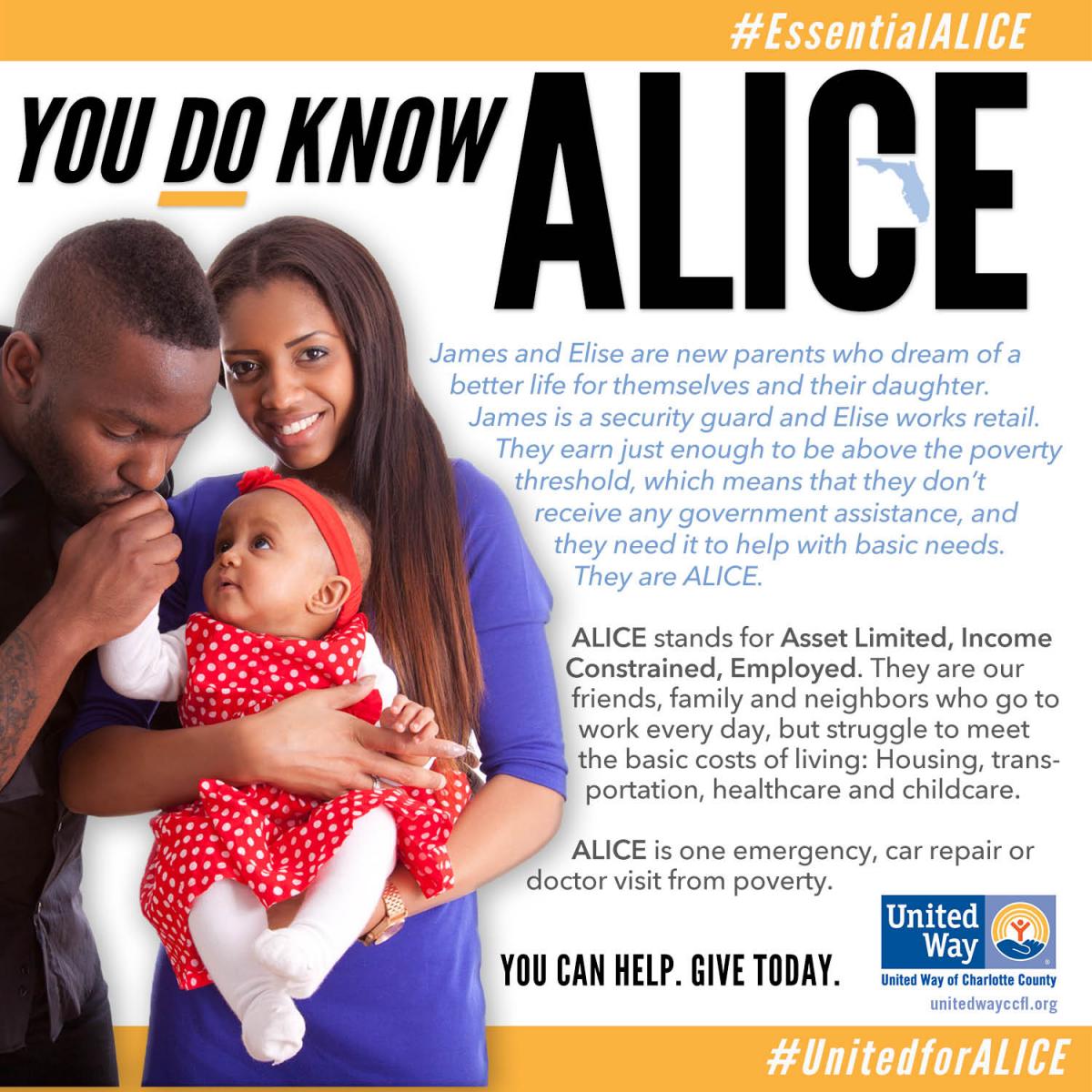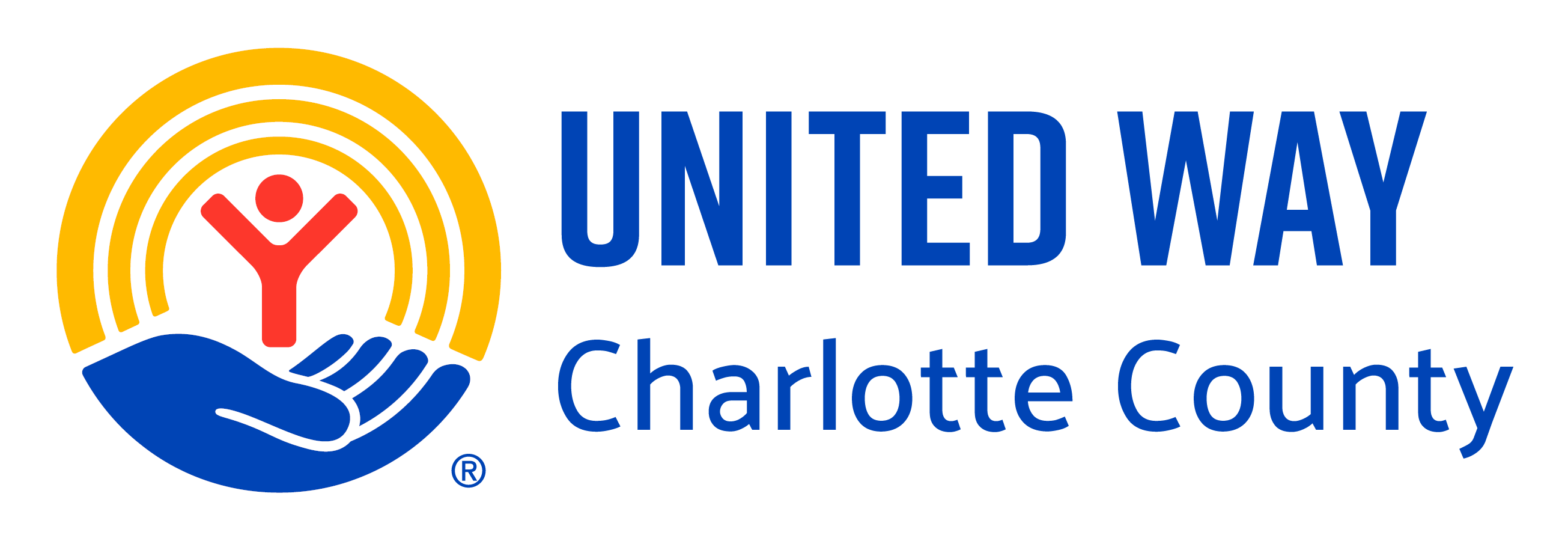ALICE Report: COVID-19 hit just as Charlotte County's rates of poverty began to drop
May 4, 2020
Collaboration has been the key to reducing poverty in Charlotte County, and with the ongoing impact of COVID-19, collaboration will be crucial to unlock continued progress toward helping local families meet their basic needs. The most recent ALICE Report, released today by the United Way of Florida, showed a decline in households living in poverty in Charlotte County as well as a decline in households that fall within the scope of ALICE (Asset Limited, Income Constrained, Employed). To read a copy of the report and find county-by-county and town-level data on the size and demographics of ALICE as well as the community conditions and costs faced by ALICE households, visit www.UnitedForALICE.org/Florida.
The 2020 ALICE Report shows improvement for Charlotte County: 10% of households were below the Federal Poverty Level and 30% fell into the ALICE category. “When COVID-19 hit, we had gone from almost half of our families struggling* to 40%,” said United Way of Charlotte County Executive Director, Angie Matthiessen. “We have undoubtedly taken a step back with the unprecedented, and still undetermined, economic impact of the crisis, but Charlotte County will rebound.”
Collaborative efforts, funded by the United Way of Charlotte County, have been focused on using a two-generation approach to ensuring brighter futures for both adults and children. The mission of the United Way of Charlotte County is to mobilize the power of our community to break the cycle of poverty. Collaboration has proven effective at guiding more local families on a path to self-sufficiency and out of poverty.
We all know people who are ALICE — Asset Limited, Income Constrained, Employed. ALICE workers educate our children, keep us healthy, and make our quality of life possible, yet do not earn enough to support their own families. ALICE households are forced to make tough choices, such as deciding between quality childcare or paying the rent, which have long-term consequences not only for ALICE, but for our entire community. “We’ve known that our economy was increasingly reliant on these families we call ALICE, who are financially vulnerable to one emergency,” said United Way of Charlotte County Board President, Charlotte Miller. “COVID-19 became that one universal emergency. ALICE families are facing the greatest health and financial risks today, as they are the workers who don’t have health insurance, have no paid sick days, and whose children rely on daily meals at school.”
Many of the households who have newly found themselves in the category of ALICE have never been here before. Not only are they struggling financially, they are struggling to know where to turn for help. That is the beauty of collaborative work. Families and individuals get connected through one organization and are then plugged in seamlessly to multiple other relevant resources. When a family has a need, they almost always have many needs, and the collaborative programs funded by the United Way of Charlotte County reduce barriers to getting families on the path of self-sufficiency.
COVID-19 has shed a new light on finding creative, and collaborative, solutions to difficult problems. “Who hasn’t done a Zoom meeting yet or propped their laptop up in bed,” asked Matthiessen. “We have all learned new tools, gained new efficiencies, and formed new professional connections through this crisis.” Moving forward, the United Way of Charlotte County will continue to promote, fund, and enhance the collaborative work that breaks the cycle of poverty for ALICE for generations to come.
The ALICE Report for Florida is a project of United For ALICE, a grassroots movement of some 650 United Ways in 21 states, corporations and foundations, all using the same methodology to document financial need. ALICE Reports provide county-by-county and town-level data, and analysis of how many households are struggling, including the obstacles ALICE households face on the road to financial independence. New in the report this year is the ALICE Essentials Index, a tool which measures the mismatch between wages and costs in a way that is more relevant to our ALICE families than the commonly used Consumer Price Index.
**It is important to note that the figures for the 2020 ALICE Report use a slightly revised methodology and are not able to be directly compared to previous ALICE figures. This improved methodology includes a more localized reflection of household costs, a better reflection of household compositions, and a more realistic reflection of the survival budget of those age 65 and over (e.g. lower transportation costs, but higher costs for treatment of chronic conditions).
This revised methodology indicates that in fact, 49% (36,700) of Charlotte County households were truly struggling in 2016 (2018 report). The 2018 data (2020 report), as presented in this latest report, shows a decrease to 40%, (10% in poverty; 30% ALICE) which equates to approximately 29,964 households. NOTE - with the previous methodology in the 2018 report, the number of ALICE households was reported to be 45% or 33,816 which was noted in UWCC Strategic Plan. The revised methodology will be utilized moving forward when tracking Charlotte County ALICE households).
An accurate and comprehensive measure of the scope of financial hardship is not easily defined using the existing official economic indicators (e.g. Federal Poverty Level, Consumer Price Index). The ALICE measures address these shortcomings to more accurately identify and assess financial hardship in the U.S. and have become a leading standard for quantifying the basic cost of living, identifying and assessing financial hardship, identifying gaps in assistance and community resources, and tracking change over time. This new methodology paints a more accurate picture of the problem through each household’s unique makeup and needs. The chart below includes figures using the modified ALICE methodology.
For more information or to find data about ALICE in local communities, visit www.UnitedForALICE.org/Florida.
About United Way Charlotte County
United Way of Charlotte County mobilizes the power of our community to break the cycle of poverty by bringing together local agencies, corporations, donors, volunteers and government to create lasting social change. Our work and our investments stay right here, supporting thousands of people every year. For more information about United Way Charlotte County, please visit UnitedWayccfl.org., or call 941-627-3539.
About United For ALICE
United For ALICE is a driver of innovation, shining a light on the challenges ALICE (Asset Limited, Income Constrained, Employed) households face and finding collaborative solutions. Through a standardized methodology that assesses the cost of living in every county, this project provides a comprehensive measure of financial hardship across the U.S. Equipped with this data, ALICE partners convene, advocate, and innovate in their local communities to highlight the issues faced by ALICE households and to generate solutions that promote financial stability. The grassroots movement represents United Ways, corporations, nonprofits and foundations in Arkansas, Connecticut, Florida, Hawai‘i, Idaho, Illinois, Indiana, Iowa, Louisiana, Maryland, Michigan, New Jersey, New York, Ohio, Oregon, Pennsylvania, Tennessee, Texas, Virginia, Washington and Wisconsin; we are United For ALICE. For more information, visit: UnitedForALICE.org.
Contact: Jennifer S. Sexton
Collective Impact Consultant
United Way of Charlotte County
941-740-1903
